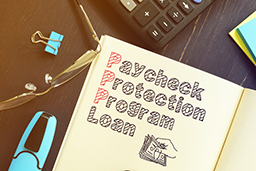Here is a question that we, at Michelman & Robinson, have fielded multiple times now: what impact does a company’s change of ownership—by way of a merger, acquisition, or otherwise—have upon existing loans issued pursuant to the Paycheck Protection Program? The Small Business Administration recently released a notice addressing this very query. Cutting to the chase: according to the SBA, it is the PPP borrower that remains responsible for its loan, regardless of any change in ownership. That being said, there are many nuances to this overall issue, which M&R breaks down here.
First Things First: What Is Considered to Be a Change of Ownership?
As a predicate matter, a change of ownership will have occurred in any of the following three instances:
- 20% or more of the common stock or other ownership units of a PPP borrower is sold or transferred, in one or more transactions, including to an affiliate or existing owner
- The PPP borrower sells or transfers at least 50% of its assets, measured by fair market value, in one or more transactions
- A PPP borrower is merged with or into another entity
Who Is on the Hook for a PPP Loan in the Wake of Change of Ownership?
The SBA has explained the PPP borrower is obligated for:
- Performance under a PPP loan
- The certifications made in connection with the loan application (economic necessity included)
- Compliance with all other PPP requirements
- Obtaining, preparing, and retaining all required PPP forms and supporting documentation and providing such information to the PPP lender or the SBA upon request
Of note, in the event a buyer, seller, or both have an outstanding PPP loan and use the loan proceeds to finance the change of ownership transaction, the parties must meet all “Loan Program Requirements” as defined by the SBA and in Federal Register notices. And to the extent a PPP loan finances the change of ownership, the proceeds may not be used to finance an escrow account.
Change of Ownership Procedures for PPP Borrowers
Prior to closing any transaction, a PPP borrower must notify its lender in writing of the contemplated change of ownership and provide a copy of all agreements relevant to the purchase, sale, or transfer. For its part, the lender is required to continue submitting monthly 1502 reports until the PPP loan is fully satisfied.
It is important to understand that the SBA will not restrict a change of ownership if, prior to closing, the PPP borrower has either (1) repaid the PPP loan in full or (2) completed the loan forgiveness process and, in terms of the latter, the SBA has remitted funds to the lender in full satisfaction of the PPP note, or the borrower has repaid any remaining balance on the loan.
Assuming a PPP loan has not been fully satisfied prior to the close of a change of ownership transaction, SBA approval of the deal may or may not be required.
When SBA Approval Is Not Required
Under some circumstances, a lender may unilaterally approve a change of ownership transaction. SBA approval will not be required if:
- The sale or other transfer of common stock or ownership is of 50% or less of the borrower’s ownership interest; or
- The borrower (1) completes a forgiveness application reflecting its use of all of the PPP loan proceeds; (2) submits the application with supporting document to the lender; and (3) establishes an interest-bearing escrow account controlled by the lender with funds equal to the outstanding balance of the loan (once the forgiveness process is complete, the escrow funds must be disbursed to repay any remaining PPP loan balance plus interest)
Parenthetically, if a change of ownership is structured as an asset sale, the borrower may sell 50% or more of its assets without the SBA’s prior approval, assuming the borrower completes a forgiveness application and establishes an interest-bearing escrow account in the same fashion as described above.
When SBA Approval Is Required
If the conditions set forth in the foregoing bullet points are not satisfied, prior SBA approval of a change of ownership transaction is required, and the lender may not unilaterally approve the deal. To obtain the SBA’s blessing, the lender must submit a request to the appropriate SBA Loan Servicing Center including, at a minimum:
- The reason the borrower cannot fully satisfy the PPP loan or establish the escrow described above
- The details of the requested transaction
- A copy of the executed PPP note
- Any letter of intent and the change of ownership agreement setting forth the responsibilities of the borrower, seller (if not the borrower), and buyer
- Disclosure of whether the buyer has an existing PPP loan (and if so, the loan number)
- A list of all the owners of 20% or more of the buyer/purchasing entity
In the context of an asset sale of 50% or more of a borrower’s assets, the purchasing entity must assume all of the borrower’s obligations under the PPP loan, which is to be memorialized in the change in ownership agreement.
In Conclusion
As mentioned above, the borrower (and successor to the borrower in the event of a merger) remains subject to all obligations under its PPP loan. At the same time, if a new owner uses PPP funds for unauthorized purposes, the SBA will have recourse against that entity for such unauthorized use.
M&R’s COVID-19 Practice Group continues to follow all significant guidance relating to the CARES Act, PPP loans, and the broader coronavirus pandemic. Please do not hesitate to contact us if you have questions regarding the legal and operational implications of this ongoing health crisis.
This blog post is not offered, and should not be relied on, as legal advice. You should consult an attorney for advice in specific situations.

